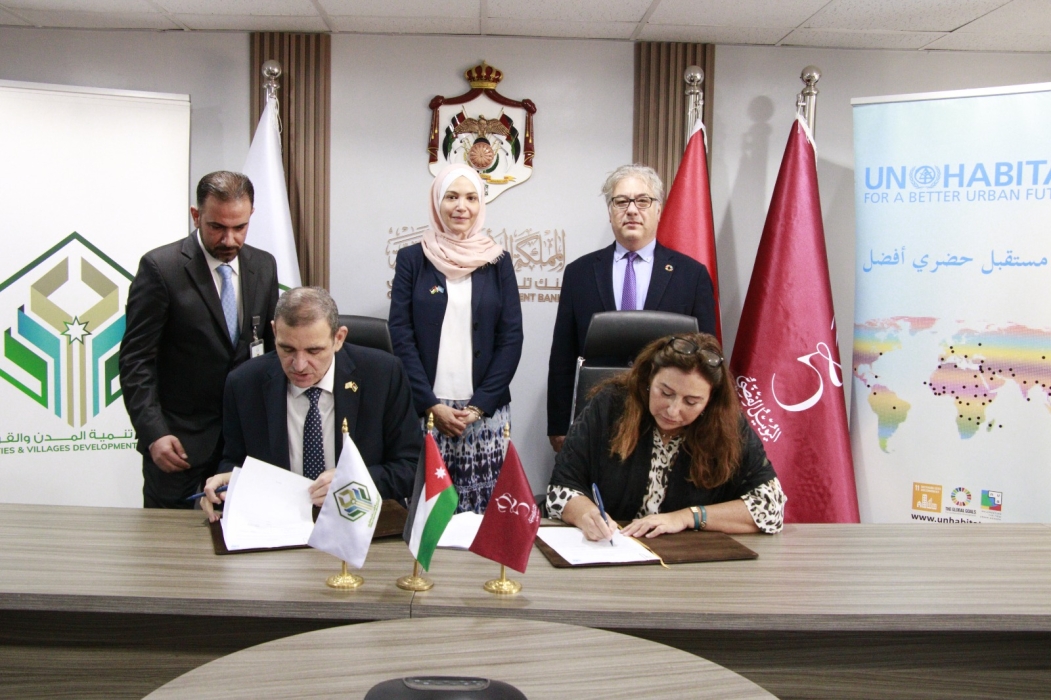- Local News
- Tue-2024-10-08 | 06:40 pm

Nayrouz News Agency :
The Cities and Villages Development Bank and the United Nations Habitat Program, in collaboration with the Office of the United Nations Resident Coordinator in Jordan, signed a memorandum of understanding (MoU) on Tuesday aimed at improving urban services and infrastructure, while enhancing the capacity of municipalities to address future challenges.
Osama Azzam, General Manager of the Cities and Villages Development Bank, emphasized that this agreement falls under joint efforts to support urban development and bolster municipal revenues across Jordan. He noted that it aligns with the Sustainable Development Goals (SDGs), the United Nations' 2030 Agenda, and Jordan’s Economic Modernization Vision.
Azzam further highlighted that the MoU is part of the bank’s commitment to backing projects that enhance the ability of municipalities to confront environmental and economic challenges while providing innovative solutions that meet the needs of local communities. He described the agreement as a significant step toward forming a strategic partnership aimed at improving sustainability and enhancing the quality of life in local communities.
Dima Abu Diab, Director of the United Nations Habitat Program in Jordan, underscored the importance of the partnership in boosting municipal revenues and advancing comprehensive and sustainable urban development at the local level.
She expressed confidence that the MoU would play a key role in developing policies and recommendations to strengthen the financial capabilities of municipalities in addressing local priorities.
Rania Hadiya, spokesperson for the UN-Habitat Regional Office for Arab States, voiced her optimism about the partnership’s potential to enhance sustainable urban development efforts in Jordan.
The MoU stems from a previous report by the Economic and Social Council and the United Nations in Jordan, titled "Taxation and Resource Mobilization for Economic, Social, and Cultural Rights." The report calls for redirecting public spending to prioritize citizens' needs and rights, improving accountability and transparency in revenue and expenditure collection, and raising awareness on how these investments enhance citizens' lives in line with the 2030 Agenda.
The agreement is grounded in an evaluation study titled "Public Financing for Human Rights – The Role of Municipal Revenues in Jordan," which highlights the critical role of municipal revenues in supporting human rights and sustainable development.
Osama Azzam, General Manager of the Cities and Villages Development Bank, emphasized that this agreement falls under joint efforts to support urban development and bolster municipal revenues across Jordan. He noted that it aligns with the Sustainable Development Goals (SDGs), the United Nations' 2030 Agenda, and Jordan’s Economic Modernization Vision.
Azzam further highlighted that the MoU is part of the bank’s commitment to backing projects that enhance the ability of municipalities to confront environmental and economic challenges while providing innovative solutions that meet the needs of local communities. He described the agreement as a significant step toward forming a strategic partnership aimed at improving sustainability and enhancing the quality of life in local communities.
Dima Abu Diab, Director of the United Nations Habitat Program in Jordan, underscored the importance of the partnership in boosting municipal revenues and advancing comprehensive and sustainable urban development at the local level.
She expressed confidence that the MoU would play a key role in developing policies and recommendations to strengthen the financial capabilities of municipalities in addressing local priorities.
Rania Hadiya, spokesperson for the UN-Habitat Regional Office for Arab States, voiced her optimism about the partnership’s potential to enhance sustainable urban development efforts in Jordan.
The MoU stems from a previous report by the Economic and Social Council and the United Nations in Jordan, titled "Taxation and Resource Mobilization for Economic, Social, and Cultural Rights." The report calls for redirecting public spending to prioritize citizens' needs and rights, improving accountability and transparency in revenue and expenditure collection, and raising awareness on how these investments enhance citizens' lives in line with the 2030 Agenda.
The agreement is grounded in an evaluation study titled "Public Financing for Human Rights – The Role of Municipal Revenues in Jordan," which highlights the critical role of municipal revenues in supporting human rights and sustainable development.








